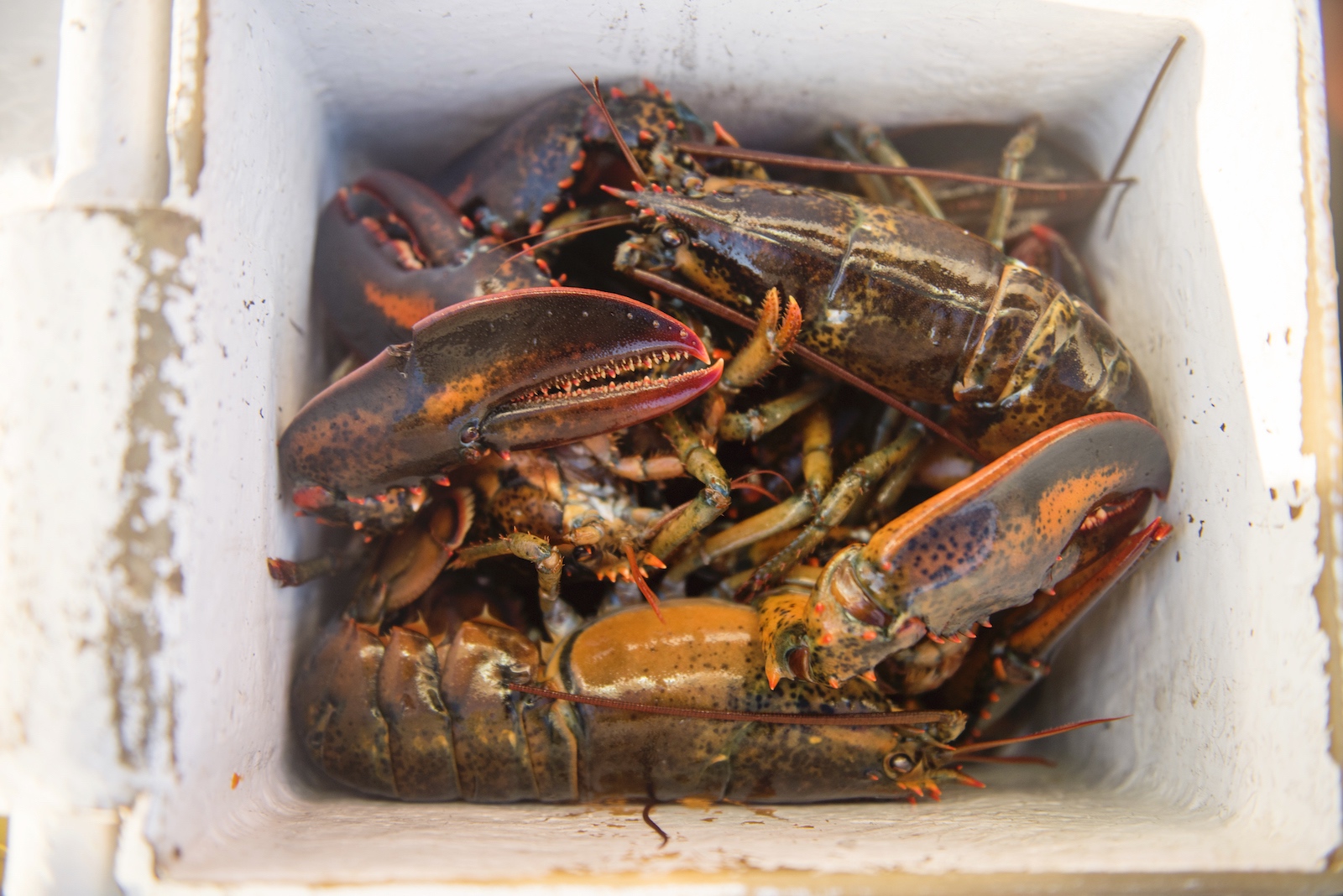
Maine Sea Grant, UMaine advance national initiative to increase lobster fishery resilience
September 3, 2020 – The Maine Sea Grant College Program staff and University of Maine scientists will advance a multi-million dollar NOAA Sea Grant American Lobster Initiative, which announced a second round of research funding today.
The newly funded research will continue to address critical gaps in knowledge about how American lobster (Homarus americanus) is affected by environmental change in the Gulf of Maine, Georges Bank and southern New England. The focus of this research is based on specific language in the NOAA National Sea Grant Program’s 2020 federal funding bill.
The American lobster is one of today’s most iconic American fisheries. The landing value of the American lobster fishery was estimated at $626.7 million in 2019 and represents one of the largest and most valuable fisheries along the Atlantic coast (Source: NOAA Fisheries.) In a 2018 report, lobster was the highest valued species group in the nation.
Yet, American lobster habitats are changing rapidly. Ocean temperatures are increasing, marine and coastal waters are becoming more acidic, and more intense rainfall events are adding more freshwater to coastal ecosystems. Scientists have already documented some of the ways that these physical and chemical changes are affecting marine species, including the American lobster. Understanding and responding to these changes will allow for a more resilient lobster fishery.
“The American Lobster Initiative provides a great opportunity to strengthen existing partnerships and build new collaborations between research, industry, and management across the northeast,” said Amalia Harrington, a marine extension team member with Maine Sea Grant and the regional extension coordinator for the American Lobster Initiative. “I look forward to working with the new research teams and to building our regional network.”
The American Lobster Initiative, which began in 2019 with an initial $2 million investment from the NOAA National Sea Grant College Program, supports both a regional Sea Grant extension program and scientific research to increase the American lobster industry’s resilience to the biological, economic, and social impacts of ecosystem change in the Gulf of Maine, Georges Bank, and southern New England. Maine Sea Grant continues to provide leadership and overall coordination for the effort, working in collaboration with six other northeast state Sea Grant programs, Sea Grant-funded researchers at more than 20 research institutions, the lobster industry, and marine resource management agencies throughout the Northeast.
The additional $2 million investment in American lobster research in 2020 will support nine new projects, two of which will be led by UMaine researchers.
Yong Chen, a professor in the School of Marine Sciences, was awarded a two-year grant to assess and forecast the dynamics of American lobster in a changing ecosystem. As ocean temperatures rise, the locations of suitable lobster habitats may change. Chen’s team will build a forecasting model, taking into account how predicted temperature changes in the Gulf of Maine may affect spatial distributions of lobster populations to predict stock size and catch seasonality. Additionally, Chen’s team will test the existing UMaine Lobster Stock Assessment model, which is currently used by the Atlantic States Marine Fisheries Commission.
“This project will provide us an opportunity to more closely engage with the Atlantic States Marine Fisheries Commission Lobster Technical Committee in our effort to further improve the University of Maine Lobster Stock Assessment Model,” said Chen. “Hopefully, this will lead to further improved lobster stock assessment and management.”
Joshua Stoll, an assistant professor in the School of Marine Sciences, was awarded a two-year grant to develop social indicators with the lobster industry to help detect early signs of vulnerability among fisheries participants in the Gulf of Maine. Understanding vulnerability is vital to informing future management decisions and coastal community resilience.
“We are thrilled to be part of the American Lobster Initiative,” said Stoll. “These social indicators will complement ongoing efforts that monitor the health of the resource itself, by bringing attention to the people who earn a living from the fishery.”
Stoll will be collaborating with Kathleen Reardon of Maine Department of Marine Resources, Carla Guenther of Maine Center for Coastal Fisheries, Patrice McCarron of Maine Lobstermen’s Association, Lisa Colburn of Northeast Fisheries Science Center, and Michael Jepson of Southeast Fisheries Science Center.
Chen and Stoll join UMaine ALI affiliate faculty Rick Wahle, director of the University’s Lobster Institute and a research professor in the School of Marine Sciences, and Damian Brady, an associate professor in the School of Marine Sciences. Wahle and Brady were funded in the 2019 call for proposals.
Maine DMR and Gulf of Maine Research Institute scientists also received funding.
Jesica Waller of Maine Department of Marine Resources will lead a team to test and develop new methods and non-invasive protocols to assess female maturity. Current methods, developed by DMR in 2018, are both time and resource-intensive.
Kathy Mills of Gulf of Maine Research Institute will lead a team developing more complex distribution models that take into account juvenile and adult life stages, environmental conditions, food web interactions, and changes over time.
Additional research supported through this round of American Lobster Initiative funding includes:
- Assessing the broad-scale distribution and abundance of lobster larvae and their potential food sources throughout the Gulf of Maine and Georges Bank, Heidi Henninger, Atlantic Offshore Lobstermen’s Association
- Bait alternative development and future visioning in the New England lobster fishery, Adrian Jordaan, University of Massachusetts
- Early life history of American lobsters in coastal Southern New England waters, Jeremey Collie, University of Rhode Island
- Surface convergences: a critical pelagic microhabitat for American lobster postlarvae? Jesús Pineda, Woods Hole Oceanographic Institute
- Understanding the cause of low dissolved oxygen in Cape Cod Bay and initiating a hypoxia warning system for the lobster fisher, Tracy Pugh, Massachusetts Department of Fish and Game
Read project descriptions for the 2019 ALI-funded research and extension projects on the ALI website.
